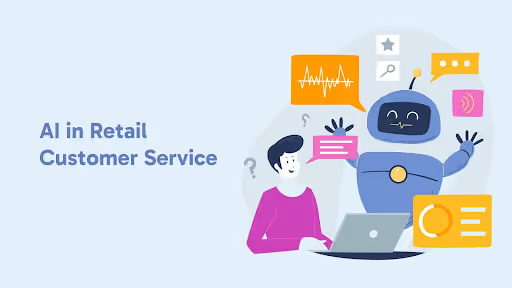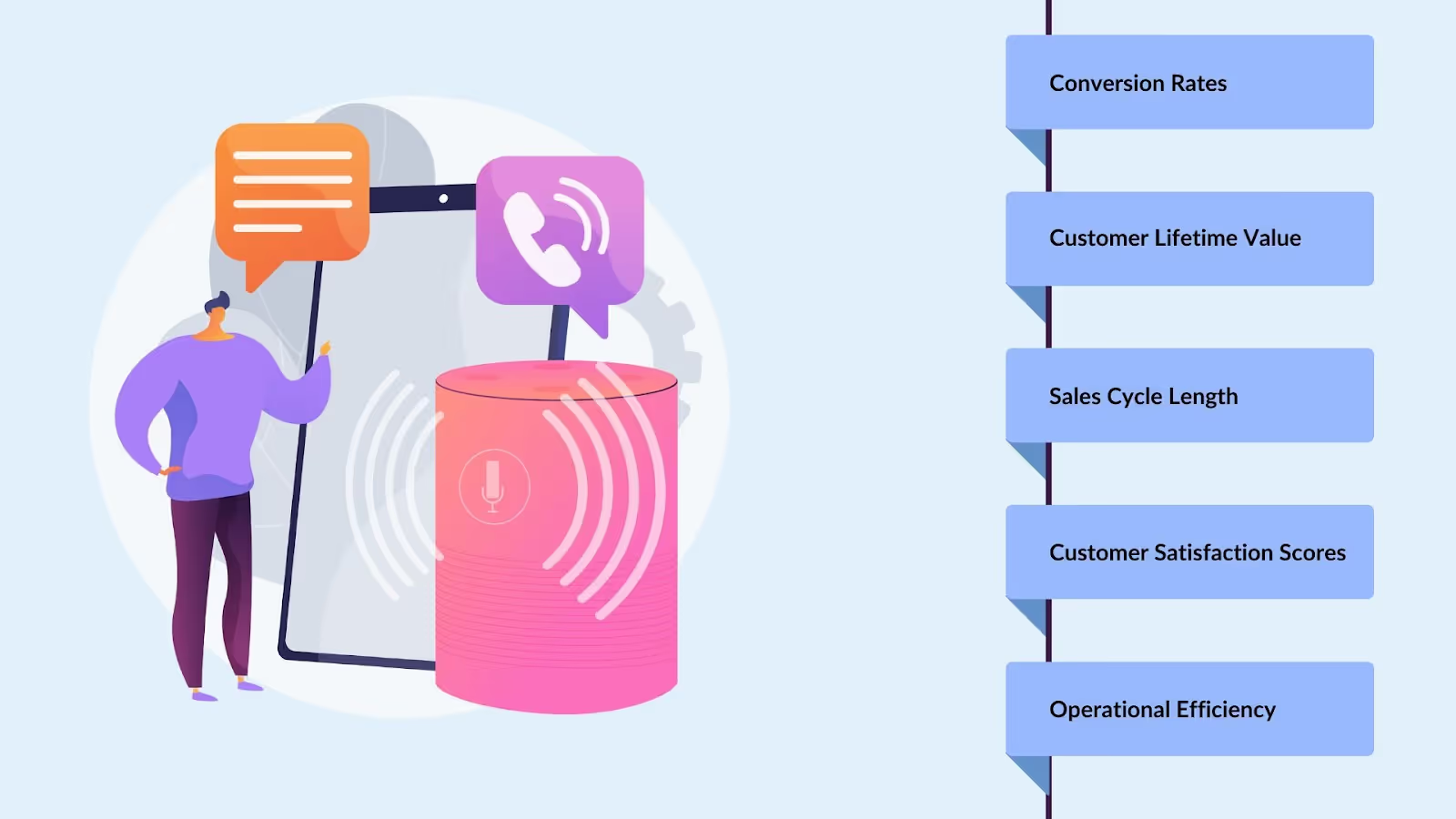AI Strategies Transforming Retail Customer Service in Future

AI Strategies Transforming Retail Customer Service in Future
In today's fast-paced retail environment, customer expectations are higher than ever. Retailers are pressured to find out what’s next AI in retail customer service inorder to provide personalized and efficient customer service while keeping up with evolving consumer behaviors.
Whats next ai in retail customer service is emerging as a game-changer, enabling retailers to meet these demands by delivering more personalized, efficient, and responsive customer service experiences.
The Role of AI in Retail Customer Service
If you want to find out whats next AI in retail customer service, you need to know what it is, it’s transforming how retailers interact with customers by providing unprecedented personalization and efficiency. By processing vast amounts of data, AI can predict customer needs and wants and deliver a service that feels tailored to the individual.
- AI-Driven Personalization:
AI in retail customer service systems, like those used by Amazon, analyzes purchasing history, browsing behavior, and social media activity to offer product recommendations. This level of personalization not only enhances the shopping experience but also drives significant sales growth. For instance, Amazon reports that its recommendation engine accounts for 35% of its sales.
- Conversational AI and Chatbots:
AI in retail customer service has evolved beyond basic chatbots. Today, AI-driven systems like IBM's Watson Assistant handle complex customer queries, provide real-time support, and learn from each interaction to improve over time. These AI tools are available 24/7, ensuring that customers receive instant support, which increases customer satisfaction.
AI in retail customer service continues to evolve, its ability to deliver personalized and responsive customer service will only increase, setting new standards in the retail industry. But what specific strategies are driving this transformation? Let's explore the key to what's next in AI in retail customer service strategies shaping the future.
Key AI Strategies Transforming Retail Customer Service
AI in retail customer service is driven by several strategies that improve operational efficiency and customer satisfaction. These strategies are not just theories; they are being implemented by leading retailers and resulting in measurable improvements in service delivery and customer engagement.
- Generative AI for Real-Time Assistance:
AI in retail customer service includes generative AI like that developed by OpenAI, used by brands like KLM Royal Dutch Airlines, which creates dynamic scripts and workflows that adapt to customer needs in real-time. For example, KLM's AI-powered service can handle customer queries from booking to real-time status updates, resulting in a 40% increase in response time.
- AI-Powered Insights and Analytics:
Retailers like Starbucks use AI in retail customer service to analyze customer interactions across multiple touchpoints, including in-store visits, online orders, and social media. These insights enable Starbucks to offer personalized rewards and promotions, leading to a 21% increase in customer loyalty and repeat visits.
- Automation and Efficiency:
AI in retail customer service automates routine customer service tasks, reduces response times, and cuts operational costs. Retailers like Zara use AI to manage inventory and optimize supply chains, ensuring products are available when and where customers need them.
These AI in retail customer service strategies are not only enhancing the customer experience but are also driving significant business outcomes. As we look to the future, what trends will further shape the role of AI in retail customer service?
Future Trends in AI for Retail Customer Service
The future of whats next AI in retail customer service is promising, with several trends on the horizon that will take the industry to new levels. These trends will build on existing innovations, pushing the boundaries of whats next AI in retail customer service can do in personalizing and optimizing customer interactions.
- AI-Enhanced Training for Customer Service Reps:
Retailers like Walmart are investing in AI in retail customer service training programs that tailor the learning experience to the individual needs of customer service reps.
- The Integration of AI with AR/VR:
AI in retail customer service includes combining AI with augmented reality (AR) and virtual reality (VR) to create shopping experiences that blur the lines between online and in-store. For instance, IKEA's AI-powered AR app allows customers to visualize furniture in their homes before purchasing, resulting in a significant increase in online sales.
- Sustainability and AI:
AI in retail customer service is also helping retailers meet their sustainability goals. H&M uses AI to optimize its supply chain, reducing waste and ensuring products are produced and distributed more efficiently.
As these trends illustrate, the future of whats next AI in retail customer service is not just about improving customer interactions but also about driving business growth and sustainability. However, with these advancements come challenges that must be addressed. As exciting as these advances are, the road to fully embracing AI in retail customer service isn't without its bumps.
Challenges in Implementing AI in Retail Customer Service
While whats next AI in retail customer service offers tremendous potential, its implementation in retail customer service is challenging. These challenges range from technical hurdles to ethical considerations, which must be carefully managed to fully realize the benefits of AI in retail customer service.
- Data Privacy and Security:
With whats next AI in retail customer service systems processing large volumes of customer data, ensuring data privacy is critical. Retailers must comply with GDPR and ensure AI systems are designed to protect customer information. For example, global retailer Carrefour implemented strict data privacy measures, resulting in a significant increase in customer trust and loyalty.
- Integration with Legacy Systems:
Integrating AI in retail customer service with existing retail systems can be complex and costly. Retailers like Target have faced challenges in integrating AI with their legacy IT infrastructure, requiring significant investment in system upgrades and staff training.
By addressing these challenges proactively, retailers can successfully integrate what's next AI in retail customer service into their operations, paving the way for future innovations. Let's look at real-life examples of how AI in retail customer service is already transforming retail customer service.
Case Studies and Success Stories
The impact of AI in retail customer service is best illustrated through real-life case studies. These examples showcase how leading retailers leverage AI in retail customer service to drive customer satisfaction and business growth.
- Amazon's Recommendation Engine: Amazon's AI in the retail customer service recommendation engine personalizes the shopping experience by analyzing customer behavior to recommend products likely to be purchased. This engine contributes to 35% of Amazon's total sales.
- Sephora's Virtual Artist: Sephora's AI in the retail customer service app, Virtual Artist, allows customers to try makeup virtually, using AR and AI to provide personalized beauty advice. This innovation has led to a significant increase in online sales and a boost in customer engagement.
- H&M's AI-Driven Supply Chain: H&M uses AI in retail customer service to optimize its supply chain, reducing waste and ensuring that products are available when and where customers need them.
These case studies demonstrate the transformative power of AI in retail customer service. But how can retailers measure the success of their AI implementations?
ROI and Measuring Success with AI in Retail Customer Service
Measuring the return on investment (ROI) of AI in retail customer service is crucial for understanding its impact and justifying future investments. Here's how retailers can assess the success of their AI in retail customer service strategies.
Key Metrics to Monitor:

- Conversion Rates: Retailers like Macy's have seen a steep increase in conversion rates after implementing AI in retail customer service strategies.
- Customer Lifetime Value (CLV): Starbucks uses AI in retail customer service to personalize customer interactions, resulting in an increase in CLV.
- Sales Cycle Length: AI in retail customer service has helped companies like Zara reduce their sales cycle, enabling faster turnarounds and increased sales.
- Customer Satisfaction Scores: Retailers who have integrated AI in retail customer service into their operations, such as Best Buy, reported an increase in customer satisfaction scores.
- Operational Efficiency: AI in retail customer service has enabled companies like Walmart to reduce operational costs, enhancing their competitive advantage.
Calculating ROI:
- Initial Investment: Consider the costs of purchasing AI in retail customer service tools, integrating them into existing systems, and training staff.
- Ongoing Costs: Include the costs of data management, model maintenance, and continuous training of AI in retail customer service systems.
- Revenue Gains: Compare revenue before and after AI in retail customer service implementation to quantify the financial benefits brought by AI
By closely monitoring these metrics, retailers can ensure their investments in whats next AI in retail customer service deliver the desired results. But how can AI be effectively integrated with human teams to maximize its benefits?
Integrating AI with Human Customer Service Teams
AI in retail customer service is powerful but works best when integrated with human customer service teams. This combination of AI and human expertise delivers a superior customer experience, blending the efficiency of AI with the empathy and creativity of human interaction.
- AI as a Support Tool: AI in retail customer service can handle data analysis, lead scoring, and sales task automation, enabling customer service teams to focus on building relationships and solving complex customer problems. For example, AI can manage routine inquiries, allowing human agents to concentrate on more nuanced customer interactions.
- Human-AI Collaboration: Training customer service teams to work with AI in retail customer service tools is essential for maximizing AI's benefits. Retailers like Nordstrom have implemented training programs that teach staff how to interpret and apply AI recommendations in real life. This training ensures that AI insights are used effectively to enhance customer interactions and drive satisfaction.
- Maintaining the Human Touch: Despite all the advances in AI in retail customer service, the human element remains crucial in customer service. AI can provide valuable data and suggestions, but it’s the human touch that builds trust, understands nuanced customer emotions, and offers personalized care. Companies like Zappos, for instance, focus heavily on human interaction, using AI to handle routine tasks while their human agents deliver exceptional service.
- Continuous Feedback Loop: Establishing a continuous feedback loop between AI in retail customer service systems and human teams ensures that AI models are constantly refined and aligned with actual customer needs.
By effectively integrating AI in retail customer service with human customer service teams, retailers can create a hybrid model that leverages the strengths of both AI and human expertise. This approach not only improves customer satisfaction but also drives operational efficiency and business growth.
Conclusion
In today's competitive retail environment, delivering exceptional customer service is more important than ever. Whats next AI in retail customer service offers a powerful way to meet evolving customer demands, providing personalized, efficient, and responsive service that sets retailers apart from the competition.
However, the true potential of AI in retail customer service is unlocked when it is integrated with human expertise, creating a customer service experience that is both data-driven and deeply personal. Retailers who embrace whats next AI in retail customer service today will be well-positioned to lead the industry tomorrow.
Unlock the Future of Retail with Nurix AI. Elevate every customer interaction, drive loyalty, and outpace the competition. Ready to see what's next? Let's revolutionize your service together. Schedule your demo today!









